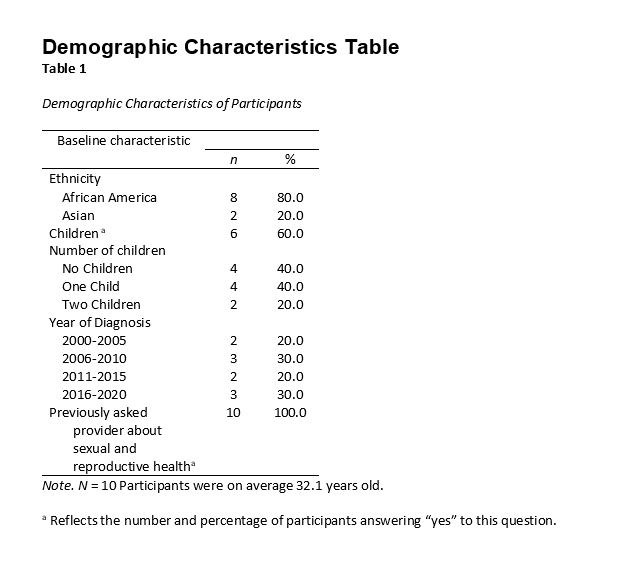Session Information
Session Type: Abstract Session
Session Time: 1:00PM-2:30PM
Background/Purpose: Systemic Lupus Erythematosus (SLE) is a chronic autoimmune condition that primarily affects women of childbearing age, with many patients being diagnosed during puberty. Contraception is recommended for women of childbearing age with lupus to prevent unplanned pregnancies, especially since certain medications used to control the disease can lead to fetal defects if taken during pregnancy. Unplanned pregnancies in lupus patients can result in adverse fetal outcomes and an increased risk of relapse, adversely affecting the patient’s life. Despite existing knowledge, there remains uncertainty regarding the impact of lupus on fertility for patients with lupus. The purpose of this study was to explore the experiences and needs of minority-identified lupus patients around sexual and reproductive health. The secondary objectives were to identify gaps and explore where improvements can be made to inform lupus patients on how to manage their reproductive health and therefore increase patient-provider trust in their reproductive health.
Methods: Ten minority-identifying women of childbearing age with a physician-confirmed diagnosis of SLE took part in a 30-minute in-depth interview from January 2023 to July 2023, online over Zoom. Participants were members of the Georgians Organized Against Lupus cohort (GOAL), a population-based cohort derived from the Georgia lupus registry. Thematic analysis was used in MAXQDA Plus 2022 to identify themes related to reproductive health with diagnosis, pregnancy, partnerships, holistic care, career, relationships with physicians, family, and medication side effects, and improvements.
Results: The participants in the study had an average age of 32.1 years and ranged in age from 26 to 44 years old. Importantly, 100% (n=10) of the participants had discussed sexual and reproductive health with a healthcare provider at some point after their lupus diagnosis. Notable themes identified were living with lupus, physician relationships to support sexual and reproductive health, and sexual and reproductive health concerning lupus.
Conclusion: Most participants were aware of reproductive health prioritization and spoke with providers about concerns that they had about reproductive health. SLE patients expressed that their overall quality of life is affected by their lupus diagnosis. They also changed their reproductive health plans based on their diagnosis. Identified gaps include unexplored emotional and psychological impacts, cultural and social determinants that influence family planning decisions among women with SLE, and socioeconomic status.
To cite this abstract in AMA style:
Shakur Y, Dunlop-Thomas C, Lim S, Narasimhan S. Lupus-Related Reproductive Health Experiences and Needs of Women of Childbearing Age: A Qualitative Study [abstract]. Arthritis Rheumatol. 2024; 76 (suppl 9). https://acrabstracts.org/abstract/lupus-related-reproductive-health-experiences-and-needs-of-women-of-childbearing-age-a-qualitative-study/. Accessed .« Back to ACR Convergence 2024
ACR Meeting Abstracts - https://acrabstracts.org/abstract/lupus-related-reproductive-health-experiences-and-needs-of-women-of-childbearing-age-a-qualitative-study/

